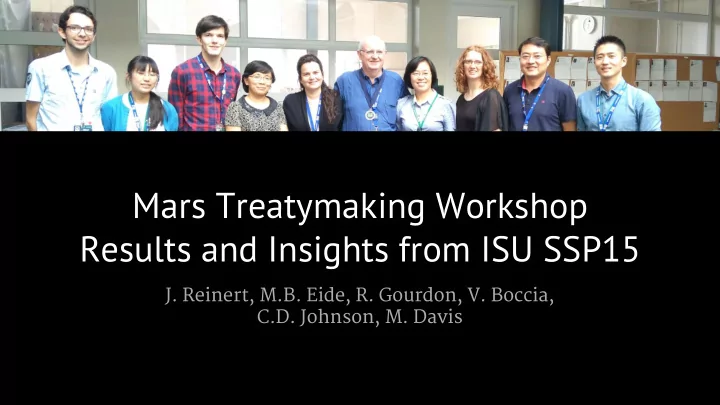

Mars Treatymaking Workshop Results and Insights from ISU SSP15 J. Reinert, M.B. Eide, R. Gourdon, V. Boccia, C.D. Johnson, M. Davis
Tensions The Problem The Group Why Mars? Relevant International Law Getting Familiarized The Solution Professional Framework Benefits of Diversity Roles Outside Your Comfort Zone Lessons Learned Key Treatymaking Behaviors and Practices The Futures? Applications Concluding remarks Conclusions
The Problem Tensions Existing treaties: Interests in Mars: Outer space [...] is not subject to Potential resources national appropriation by National self-bolstering Claims of sovereignty, ● Scientific exploration Means and use of occupation, ● Arena for international cooperation? or by any other means. [Outer Space Treaty, 1967] Image: ESA
The Problem The Group French electronics engineering student, COPUOS Chair Japanese catalytic combustion student, COPUOS observers: Norwegian astrophysics student, Holy See Chinese Aerospace department leader, ESA Italian Space Agency lawyer, Delegates: Australian space law expert, Austria, Chinese Satellite Comm. Co. secretary general, France, American NASA systems engineer , China, Chinese Great Wall deputy manager, Republic of Korea, Korean fighter pilot , Russian Federation, American project manager , United States of America Italian aerospace engineer
The Problem Why Mars? Evoked our aspirations - Mars as the “promised land” ● Cultural and historical rationales for presence on ● Mars differ: Nature ○ SPACE? TECH Conquering the “wilderness” vs Symbiosis ■ Society ○ Expansion vs Inner stability ■ Technology ○ Supporting society or solely for harnessing resources? ■ SOCIETY NATURE Space? ○ Mars as indicator on humanity’s evolutionary ● readiness to leave the Tsiolkovskian cradle = (SUPER)ECOLOGY [Von Puttkammer, 1987]
The Problem Relevant International Space Law 1967 1979 + Outer Space Treaty Moon Treaty 1968 Rescue Outer Space: benefit all Moon and other celestial Agreement bodies (incl. Mars) mankind + 1972 Exclusive use: peaceful Free for exploration Liability purposes Convention Not: National appropriation Environments should not be and claim of sovereignty + disrupted 1976 Use: solely for peaceful Registration UN : to be informed of use of purposes Convention Mars and location Avoid harmful contamination of space and bodies Moon’s (+++) natural resources: common heritage of all mankind
Getting Familiarized The Solution Photo: Nikola Schmidt
Professional Framework The Solution
Benefits of Diversity When having an Formality of UN COPUOS Valuable insights would engineering background: session was enlightening. not have been shared if had to adapt - from Exposed to this, learned everyone had the same numbers and equations to the need to speak background bargaining over words respectfully and clearly Affecting the negotiation: Non-space faring states Learned Lessons Personality and have large influence, will the stance of the nation affect the length and they are representing complexity of the process - may take decades
Roles Outside Your Comfort Zone One's interests not aligned Insider vs outsider perspective - Swapping of roles allowed with the country you are very apparent that these are us to express our representing - requiring us not the same when others understanding of other to shift perspective and not represent your own agency nations’ priorities and values express personal opinions Learned Lessons Selfie: Curiosity/NASA
Key Treatymaking Behaviors and Practices Negotiations Organisation Behind closed doors Unstated agreement: Small countries as mediators: Confidence and trust-building: striving to reach agreements propose solutions Sharing of information and that everyone could accept - that would not be accepted if possibly incriminating adhering to idea of coming from an “ opposing ideas an evolved way of leadership power ” Learned Lessons Pre-committee meetings (allies): Potential to influence Consensus-based decision of paramount importance negotiations: making takes time through informal social - lessen the interactions Agree on but is easier to achieve when difficulties of acceptable ideas all parties are open to listen to reaching from opposition allow strategy- each other consensus (bargaining cards) building
The Futures? Change in terminology: Moon Treaty: From “man” to “humankind”, Easy to draw a parallel to “colonisation” to “continued Mars - the Moon Treaty had presence” no significant impact Learned Lessons Concern from less Different roles in influential states about COPUOS: attempts on allowing appropriation Member states may have opinions differing from Atmosphere of mother agencies competition? Photo: Scott Kelly/NASA
Applications Practice negotiations in an ● international forum Helpful for any who wants to ● engage in international activities Organiser must know the ● setting to be taught Workshop format suitable ● outside ISU Conclusion Photo: (C) Indian Space Research Organisation, Mars Colour Camera (MCC)
Photo: Lazellion, Creative Commons BY-NC-ND Conclusions Greater understanding of importance of the inspiration provided by humanity’s entry into space and the potential exploration of Mars by humankind. Things to Consider: Political will for a Mars Workshop provided solid Space: Treaty? introduction develop mutual understanding and Aligning this treaty with Extremely realistic strengthen friendly relations others? Revision of old concepts? Advance lectures and Process: Mars landing before treaty distribution of material Lengthy, complicated and (as with Moon landing and crucial to its success frustrating unsuccessful Moon Treaty?) Conclusion High impact even though Opposition of ideas between Better: principle declaration relatively short time spent main space powers? by UN GA than a full treaty?
Recommend
More recommend